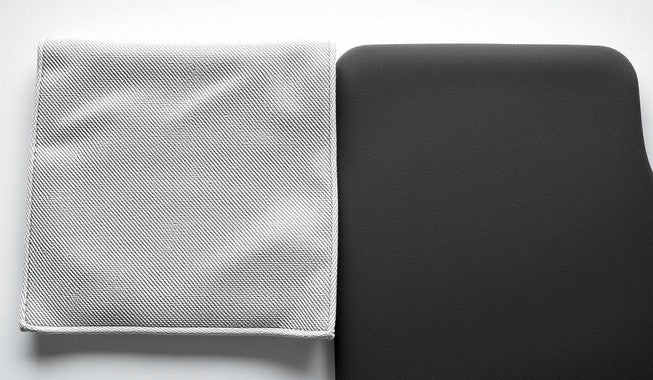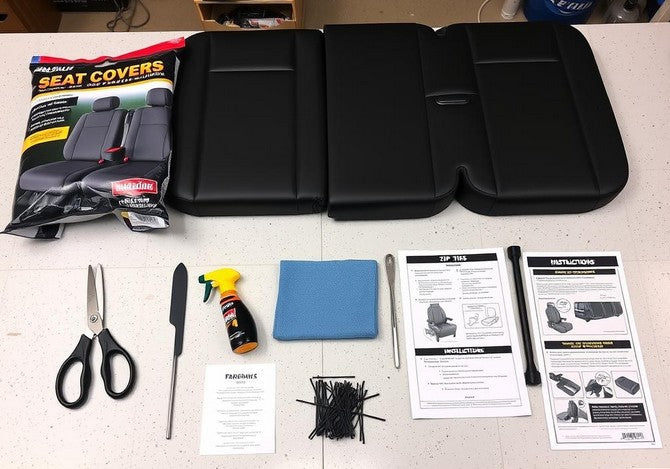Truck owners know that the right seat covers aren't just accessories—they're essential investments that protect your vehicle's interior from daily wear and tear. Whether you're hauling tools for work, taking the family on outdoor adventures, or dealing with muddy paws from your four-legged companions, quality seat covers can save you hundreds in upholstery repairs and maintain your truck's resale value.
When it comes to choosing the best material for truck seat covers, canvas and neoprene consistently emerge as top contenders. Each offers distinct advantages for different situations and needs. This comprehensive comparison will help you determine which material—canvas or neoprene—is the better choice for your specific truck and lifestyle requirements.
Understanding Canvas and Neoprene Materials
Canvas (left) features a tight weave pattern while neoprene (right) has a smooth, rubber-like surface
Before diving into specific comparisons, let's understand what these materials actually are. Canvas seat covers are made from heavy-duty woven cotton or cotton-blend fabrics. They're known for their rugged durability and classic, utilitarian appearance. Neoprene seat covers, on the other hand, are crafted from synthetic rubber—the same material used in wetsuits—offering excellent water resistance and a more modern, fitted look.
Both materials have earned their place in the truck accessory market, but their distinct properties make each better suited for particular situations. Let's examine how they compare across the most important factors truck owners should consider.
Water Resistance: Keeping Your Seats Dry
When it comes to protecting your seats from moisture, there's a clear difference between these materials. Neoprene seat covers excel in water resistance, thanks to their rubber-like composition. They effectively repel water, preventing it from soaking through to your upholstery. This makes neoprene an excellent choice for those who frequently encounter wet conditions, whether from rain, snow, or water activities.
Canvas seat covers offer moderate water resistance, especially when treated with water-repellent coatings. However, they aren't completely waterproof by nature. Canvas will eventually allow moisture to seep through during prolonged exposure, though it dries relatively quickly. Many premium canvas covers come with additional waterproof backing for enhanced protection.
Need Maximum Water Protection?
Discover our premium waterproof neoprene truck seat covers that provide complete protection against spills, rain, and moisture while maintaining comfort on long drives.
Durability: Standing Up to Daily Wear and Tear
Canvas Durability
Canvas seat covers are renowned for their exceptional toughness. The tight weave of canvas fabric creates a surface that's highly resistant to tears, punctures, and abrasions. This makes canvas covers particularly well-suited for work trucks that regularly transport tools, equipment, and building materials.
Canvas also offers excellent UV resistance, maintaining its integrity even after prolonged sun exposure. This means less fading and deterioration over time, even for trucks parked outdoors regularly. The material typically has a longer overall lifespan than neoprene when subjected to rough daily use.
Neoprene Durability
While not as puncture-resistant as canvas, neoprene seat covers offer good durability with different strengths. Neoprene excels in flexibility and shape retention, maintaining a snug fit over time without sagging or stretching out of shape. It's also highly resistant to chemicals, oils, and most stains.
Neoprene's natural elasticity allows it to absorb impact without tearing, though sharp objects can potentially puncture it more easily than canvas. Most quality neoprene covers are UV-stabilized to prevent sun damage, though they may show more visible wear over time compared to canvas.
Comfort and Temperature Tolerance
The comfort of your seat covers significantly impacts your driving experience, especially on longer trips. Neoprene seat covers generally provide superior comfort with their soft, cushioned feel. The material contours to your body and the seat shape, creating a more customized fit. Neoprene also offers moderate temperature regulation, staying relatively cool in summer and warm in winter.
Canvas seat covers tend to be firmer and less padded, which some drivers prefer for better support. While initially stiffer, quality canvas covers soften over time while maintaining their structure. Canvas breathes better than neoprene, which can be an advantage in hot climates where neoprene might feel warm or sticky against bare skin.
|
Feature |
Canvas Seat Covers |
Neoprene Seat Covers |
|
Water Resistance |
Moderate; water-resistant but not waterproof |
Excellent; highly water-repellent |
|
Tear Resistance |
Excellent; highly resistant to punctures |
Good; flexible but more prone to punctures |
|
UV Resistance |
Very good; minimal fading |
Good; may show wear faster |
|
Comfort |
Firm; breaks in over time |
Soft; cushioned feel from the start |
|
Breathability |
Better airflow; cooler in hot weather |
Less breathable; can feel warm in summer |
Pros and Cons: Canvas vs Neoprene at a Glance
Canvas Pros
- Superior tear and puncture resistance
- Excellent for work trucks and rough use
- Better breathability in hot weather
- Typically more affordable
- Classic, rugged appearance
- Longer overall lifespan with heavy use
Canvas Cons
- Less water-resistant than neoprene
- Initially stiffer and less comfortable
- Typically fewer color and pattern options
- May not fit as snugly as neoprene
- Can be harder to clean thoroughly
Neoprene Pros
- Excellent water resistance
- Superior comfort and cushioning
- Contours well to seat shape
- Easy to clean with simple wipe-down
- More color and design options
- Better for occasional use vehicles
Neoprene Cons
- More vulnerable to tears and punctures
- Can feel warm in hot weather
- Typically more expensive
- May show wear faster with heavy use
- Some have initial rubber-like odor
Best Applications: Which Material Suits Your Needs?
When Canvas Seat Covers Excel
- Work Trucks: If you use your truck for construction, landscaping, or other trades, canvas offers superior protection against sharp tools and heavy equipment.
- Off-Road Adventures: Canvas stands up better to the dirt, rocks, and debris that come with off-roading.
- Hot Climates: The better breathability of canvas makes it more comfortable in consistently hot weather.
- Budget-Conscious Buyers: Canvas typically offers better value for those looking for durability at a lower price point.
When Neoprene Seat Covers Shine
- Family Vehicles: Neoprene's water resistance and easy cleaning make it ideal for families with children and their inevitable spills.
- Pet Transportation: The waterproof properties help manage accidents and drool, while being more comfortable for your pets.
- Water Activities: If you're frequently driving with wet swimwear or fishing gear, neoprene's water resistance is invaluable.
- Comfort Priority: For those who value a softer, more cushioned feel, especially on longer drives.
Find Your Perfect Truck Seat Covers
Based on your specific needs, we can help you select the ideal seat covers for your truck. Our premium options in both canvas and neoprene are designed for maximum protection and comfort.
Installation and Maintenance Tips
Canvas Installation & Care
Canvas seat covers typically require a bit more effort during initial installation due to their stiffer nature. They often need to be stretched into place and may take time to conform to your seat's exact shape. However, this initial stiffness contributes to their durability.
Maintenance tips for canvas covers:
- Vacuum regularly to remove dirt and debris
- Spot clean stains with mild soap and water
- For deeper cleaning, most canvas covers can be machine washed on gentle cycle
- Air dry completely before reinstalling
- Consider applying additional water-repellent treatment annually
Neoprene Installation & Care
Neoprene seat covers are generally easier to install thanks to their natural elasticity. They stretch easily over seats and conform quickly to the contours. Most quality neoprene covers include reinforced seams and non-slip backing to prevent shifting.
Maintenance tips for neoprene covers:
- Wipe down with damp cloth for regular cleaning
- Use mild soap for tougher stains
- Some neoprene covers are machine washable (check manufacturer instructions)
- Always air dry completely to prevent mildew
- Avoid harsh chemicals that can break down the neoprene
Price Comparison: Budget Considerations
The cost difference between canvas and neoprene seat covers can be significant and should factor into your decision-making process. Generally, canvas seat covers are more affordable, with quality options ranging from $80-$150 for a complete set. Their lower price point combined with excellent durability makes them a cost-effective choice for many truck owners.
Neoprene seat covers typically command a premium price, with quality sets ranging from $150-$300. The higher cost reflects the material's water-resistant properties, comfort features, and often more complex manufacturing process. For those who need the specific benefits of neoprene, the additional investment can be worthwhile for the protection and comfort provided.
|
Quality Level |
Canvas Price Range |
Neoprene Price Range |
Value Consideration |
|
Entry-Level |
$50-$80 |
$100-$150 |
Basic protection, shorter lifespan |
|
Mid-Range |
$80-$120 |
$150-$200 |
Good balance of quality and affordability |
|
Premium |
$120-$180 |
$200-$300 |
Maximum durability, additional features |
When evaluating value, consider how long you plan to keep your truck and the conditions the seat covers will face. Premium options in either material typically offer better fitment, stronger seams, and additional features like reinforced wear points or enhanced water resistance that can extend their useful life.
Buyer's Guide: 5 Key Factors for Choosing Truck Seat Covers
- Climate Considerations: If you live in a rainy or humid environment, neoprene's water resistance gives it an edge. For hot, dry climates, canvas's breathability may be more comfortable.
- Primary Usage: Consider what you use your truck for most often. Work trucks benefit from canvas's durability, while family vehicles might prioritize neoprene's comfort and easy cleaning.
- Budget Constraints: Be realistic about your budget. Quality canvas covers offer excellent protection at a lower price point if water resistance isn't your top priority.
- Aesthetic Preferences: Canvas provides a more rugged, traditional look, while neoprene offers a sleeker, more modern appearance with more color options.
- Longevity Expectations: If you need seat covers that will last for many years of heavy use, canvas typically edges out neoprene for sheer durability.
Pro Tip: Many manufacturers now offer hybrid covers that combine a canvas exterior with a waterproof backing layer, giving you the best of both worlds. These can be an excellent compromise if you're torn between the two materials.
Frequently Asked Questions
Do neoprene seat covers smell?
New neoprene seat covers may have a slight rubber-like odor initially, similar to a new wetsuit. This smell typically dissipates within a few days to a week with proper ventilation. Quality neoprene covers undergo treatments to minimize this effect. If odor persists, a gentle cleaning with mild soap and water can help.
Can canvas seat covers handle mud and dirt?
Yes, canvas seat covers excel at handling mud and dirt. The tight weave prevents particles from becoming embedded in the fabric, and most mud will dry and can be brushed or vacuumed off. For stubborn stains, canvas can be spot cleaned or even machine washed in most cases, making it an excellent choice for off-roading and work trucks.
Which material is better for trucks with pets?
Both materials have advantages for pet owners. Neoprene is more water-resistant and easier to wipe clean from accidents and drool. However, canvas is more resistant to claw punctures and scratches. If your pet is well-behaved but occasionally wet or drooly, neoprene might be better. For dogs that dig or scratch at seats, canvas offers superior puncture resistance.
Will seat covers affect heated or cooled seats?
Both canvas and neoprene seat covers will somewhat reduce the effectiveness of heated or cooled seats, with neoprene typically creating more insulation than canvas. However, many premium seat covers are designed with thinner material in strategic areas to allow better heat transfer. If your heated/cooled seats are important to you, look for covers specifically designed to be compatible with these features.
How long do truck seat covers typically last?
With proper care, quality canvas seat covers can last 5-7 years or more, even with regular use. Neoprene covers typically last 3-5 years before showing significant wear. The lifespan of either material depends greatly on usage conditions, sun exposure, and maintenance. Work trucks and vehicles with heavy use will see faster wear regardless of material choice.
Conclusion: Making Your Final Decision
When choosing between canvas and neoprene truck seat covers, there's no one-size-fits-all answer. Your ideal choice depends on your specific needs, truck usage, and priorities. Canvas offers superior durability and puncture resistance at a more affordable price point, making it perfect for work trucks and rough use scenarios. Neoprene provides excellent water resistance and comfort, ideal for family vehicles and situations where spills and moisture are common concerns.
Consider your typical driving conditions, how you use your truck, and what features matter most to you. Many truck owners find that the material that aligns with their primary use case provides the best long-term satisfaction. Remember that quality matters regardless of material—a well-made canvas cover will outperform a poorly made neoprene one, and vice versa.
Protect Your Truck Seats Today
Ready to invest in quality protection for your truck? Browse our selection of premium canvas and neoprene seat covers, custom-fitted for your specific truck model.




Leave a comment
This site is protected by hCaptcha and the hCaptcha Privacy Policy and Terms of Service apply.